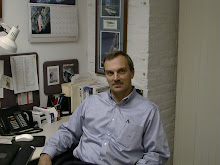I was fortunate to attend the 'Reinventing Product Development' seminar held by PTC this month. The presentations were excellent and one stood out because it addressed the myths and mis-information that are being used in the Globalization debate. It turns out that little methodical research has been used to develop the 'facts' presented in this debate and reported by the media as such. Vivek Wadhwa, the speaker, started researching this issue at Duke and has discovered that much of the accepted CW (conventional wisdom) was incorrect, based on facts. You should read this interesting paper; Feeling the Elephant and explore the rest of this site at GlobalizationResearch.
As an Agricultural Engineer, I am extremely interested in the Bio-Fuels debate. I am especially concerned about the recent allegations that Bio-fuel use is causing a global increase in cost of food or even a shortage of food. I have heard several neighbors and acquaintances echo these concerns asserting that this is true. As I researched the issue, I've found that the increase in food prices is primarily due to increased fuel costs and the increased demand in India and China for more food and less energy efficient food (i.e. meats).
I remember listening to a lecture regarding renewable resources last year, where the speaker mentioned that the fossil fuel companies had created a $100MM fund to 'address' the competition from renewable resources. Is it a coincident that food prices are rising due to fossil fuel costs, but the media is blaming them on one of the possible cures for high fuel costs?
Which brings me to the point of this article. The current media environment is one in which anyone with a computer can affect the debate. This 'new media' is inexpensive and dynamic but is not driven by knowledge or dedication to the truth as much as it is by doctrine and self interest. This competition is causing the so-called main-stream media to try to reduce costs and respond to events faster. Unfortunately, the path they've chosen is to reduce quality (sounds familiar to those of us involved in manufacturing during the 70's and 80's). We are faced with societal decisions that can be classified and garbage in - garbage out.
That's were we come in. As engineers we are used to making decisions based on facts and we are skilled at finding the relevant facts. We need to take time to research the important issues of the day so that we can provide thoughtful analysis when presented the opportunity. We need to reestablish the trust that our method of thoughtful analysis is the only way to develop solutions to today's problems. Who knows maybe one day being an engineer will be more important than being a lawyer for a political career.
Have a good week!
Subscribe to:
Post Comments (Atom)

No comments:
Post a Comment